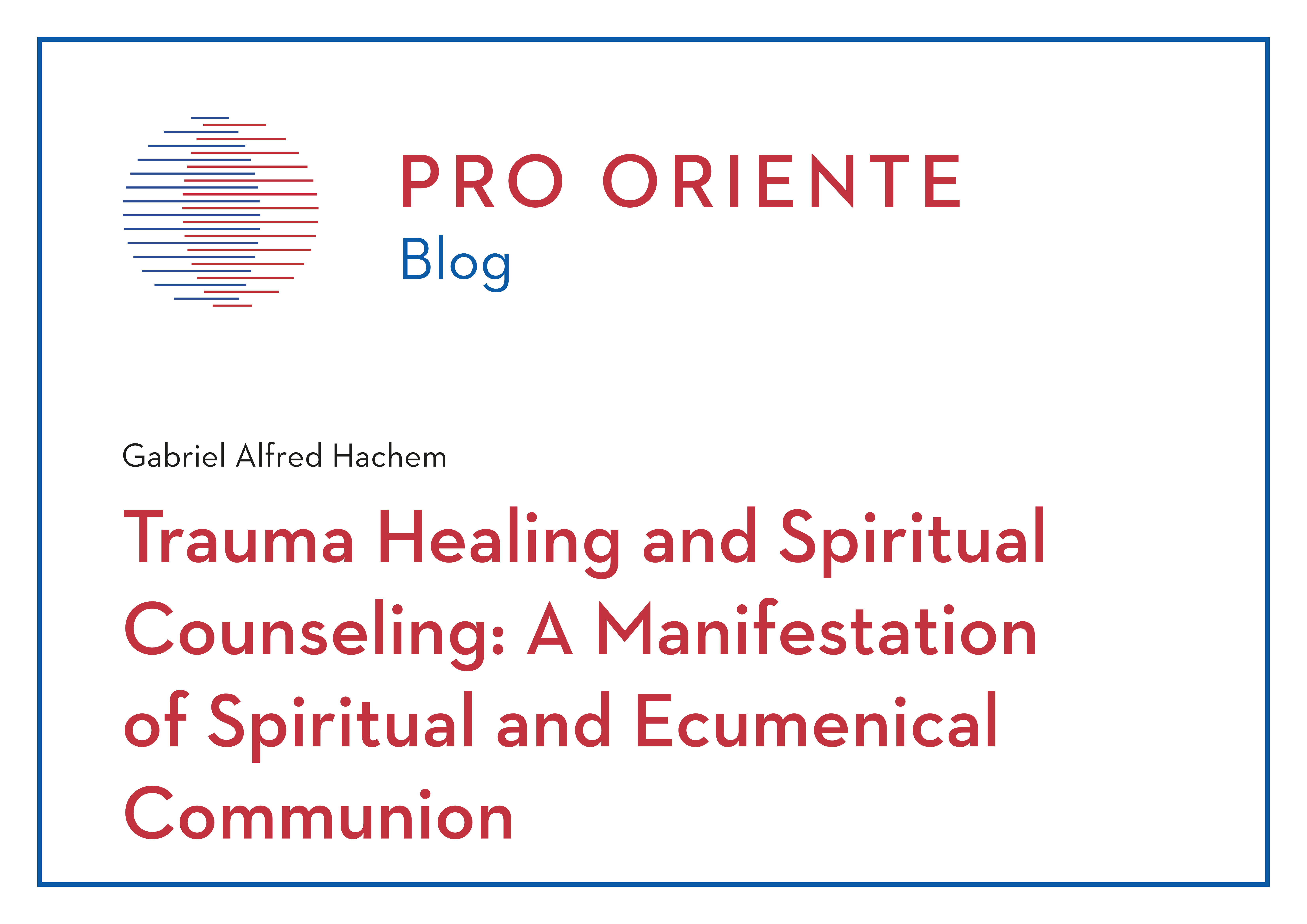Trauma Healing and Spiritual Counseling: A Manifestation of Spiritual and Ecumenical Communion
19. November 2024
Thema: Healing of Wounded Memories

What are the theological foundations for wounds healing in Christian life and in the ecumenical movement, as experienced in the Middle East?
1 Christ the Wound Healer and the closest neighbor
According to the parable of the Good Samaritan (Luke chap. 10), the fullness of Christ's ineffable tenderness is manifested through his compassion for the wounded man, lying alone on the side of the road. Christ, the Master, is ‘the stranger by his divine nature’ who drew near (kenosis) and became one of us by emptying himself and descending from the upper Jerusalem to Jericho. He became our closest neighbor and he is our Good Samaritan.
Apostle Paul says (1 Cor. 12, 26): ‘If one member suffers, all the members suffer with it.’ In the second letter to the Corinthians (11, 29), he states: ‘Who is weak and I am not weak? Who suffers and I am not burned?’ These two verses express the depth sense of spiritual, practical, and even physical communion among the members of the one body of Christ. This communion goes beyond the realms of human solidarity and empathy to express the mystical relationship between the Church and Christ.
2 Trauma Healing and Spiritual Counseling as ecumenical Program
There is no doubt that the pains caused by violent traumas, as a result of wars, violence and exploitation are the strongest because they leave us with bloody effects, beyond normal therapies, psychological support, and fraternal support. The Middle East Council of Churches developed a special program for ministers to help them healing from trauma, after violent wars, through an advanced program that combines health care, psychotherapy and spiritual counseling.
A program born out of trauma in an ecumenical and synodal spirit
After the Israeli war on Lebanon in 2006, with a grant offered by the Presbyterian Churches of North America (PCUSA), MECC organized with ministers who had trained some sessions on trauma healing and spiritual counseling, for two years. In 2018, the program was relaunched with a team of spiritual counsellors and psychotherapists, who held meetings to assure the harmony between them on the topics raised and the methods of conducting individual face to face meetings. The program’s aim was only to initiate the healing process and help the persons regain their life and the momentum of their ministry.
A spiritual program inspired by the Gospel
Four words of Christ were selected to form the backbone of each session and chart the way forward psychologically and spiritually.
a) ‘Why do you smite me?’ (John 18:23).
This first word expresses the depth of shock, the rejection of the painful reality and the inner revolt against events. Trauma raises some existential questions: Why me? Why now? Why this disease? Why this violence and vain injustice? Then begins the spiral of descent into hell, the decay of the body, the sluggishness of the soul and the lethargy of the spirit.
Jesus always raised questions and asks about the cause of the trauma to release the word in his disciples. He asks the disciples of Emmaus: What are you talking about? And Mary Magdalene: Why are you crying? He asks the apostles in the ship tossed by the waves: ‘Why are you afraid?’ Without these emotional questions, man dies and faith dies. The question as a sign of presence, attention, appreciation and respect that puts the wounded person at the center of the program.
b) ‘My God, my God, why have you forsaken me?’ (Mt 26:47)
Sometimes, the trauma affects the faith. In the depth his unconsciousness, the believer thinks that God has abandoned him and left him to his fate, alone and defenseless. Many could then lose their faith meanwhile others experienced the opportunity to deepen it and build it on the rock of Christ. Looking at the human Jesus, kneeling on the Mount of Olives and hanging on the cross, addressing God: ‘Father, let this cup pass from me... But not my will, but thine be done... My God, my God, why have you forsaken me?’ could help traumatized people to keep their faith.
c) ‘Father, forgive them’ (Luke 23:34)
Without forgiveness, there is neither healing from traumas nor healing of wounds. The culmination of Christ's life is represented in his words on the cross, when his heart became a flowing spring of love for others, because forgiveness is the most powerful sign of love.
d) ‘I am the resurrection and the life’ (John 11,25)
Christian hope is not just about the future and destiny. It is a belief in the resurrection and the life that God wants for every human being. Fullness of life, abundant and resurrected life (John 10,10). Hope is the meaning and purpose of life. He who has no hope has died while alive. The Risen Jesus brings Mary Magdalene out of the darkness of the empty tomb into the garden of life, and Lazarus from death to life.
A scientific program that uses human sciences and psychotherapy
The program is based on psychology and its methods of listening and therapy, focusing on each person and its wounds. The personal face to face with psychotherapists and counsellors is an advanced step that allows the person to rebuild confidence and integrate Christ’s Life.



